If you spend any time at all on the internet, you’ve probably come across stories of successful digital marketers living their best lives, earning great money, and traveling the world as digital nomads.
Maybe you’ve wondered whether you could do that, or whether you’d need to get a marketing degree to pull it off. Well, wonder no more.
In this post, we unpack how you can get started in digital marketing without any qualifications, and offer definitions of different digital marketing specializations and their respective average salaries, tips on how to get started and how to land a job in digital marketing, as well as a roundup of top digital marketing courses and influencers to follow to help you learn and keep you up to speed on the latest industry news and trends.
What Is Digital Marketing?
Digital marketing is an extremely broad field ranging from web development to graphic design to writing, paid advertising, and all things in between. In a nutshell, it refers to any marketing activities that take place online.
Digital marketing is a career path that holds some exciting opportunities. Unlike a lot of other industries, digital marketing is growing rapidly as more and more businesses realize how important it is to have an easily searchable online presence to help potential customers find them. The COVID-19 crisis has only accelerated this trend, especially with online traffic and transactions seeing huge spikes as a result of widespread lockdowns.
Of course, as everyone moves online, there’s massive competition for every business that hopes to get eyeballs on their sites – which is where digital marketing comes in.
Digital marketing can be a very lucrative career choice. According to Glassdoor data, the average annual income for digital marketers in the U.S. is $74,234, and digital marketing managers make on average $75,251.
The best part? The barrier to entry for getting started in digital marketing is low, and proven results carry far more weight than qualifications.
Below, we’ve outlined some of the common digital marketing specializations and included some salary information so that you can get a good feel for your options.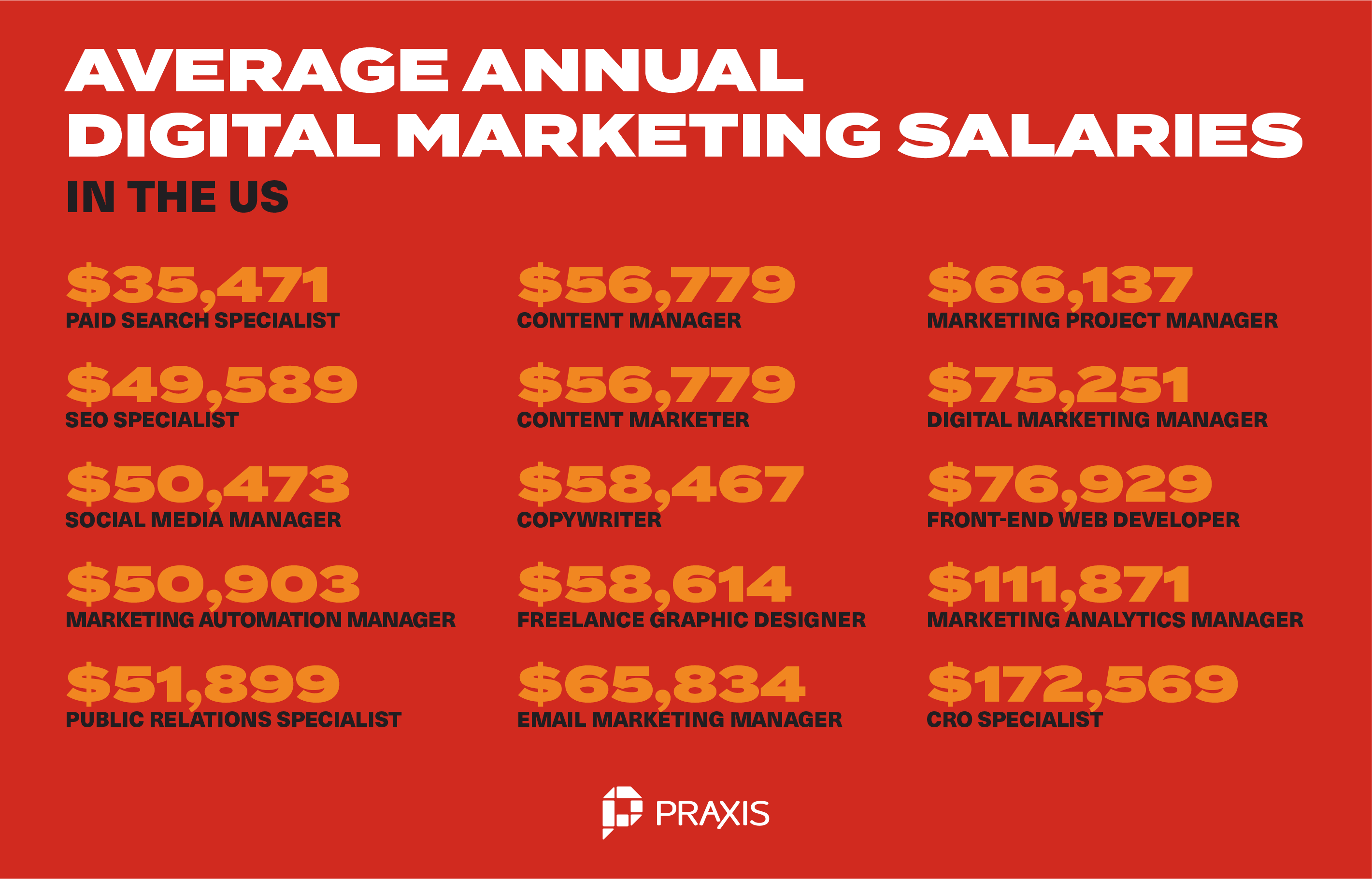
SEO
The term SEO gets thrown around a lot, and deservedly so. Knowledge of search engine optimization best practices is one of the most important skills a digital marketer can have, regardless of their area of specialization.
In a nutshell, SEO refers to the strategies and tactics digital marketers use to boost a site’s position on search engine results pages to get organic traffic, such as creating content that targets the specific keywords that consumers use to search for products and services.
SEO specialists in the U.S. make around $49,589 per year, on average.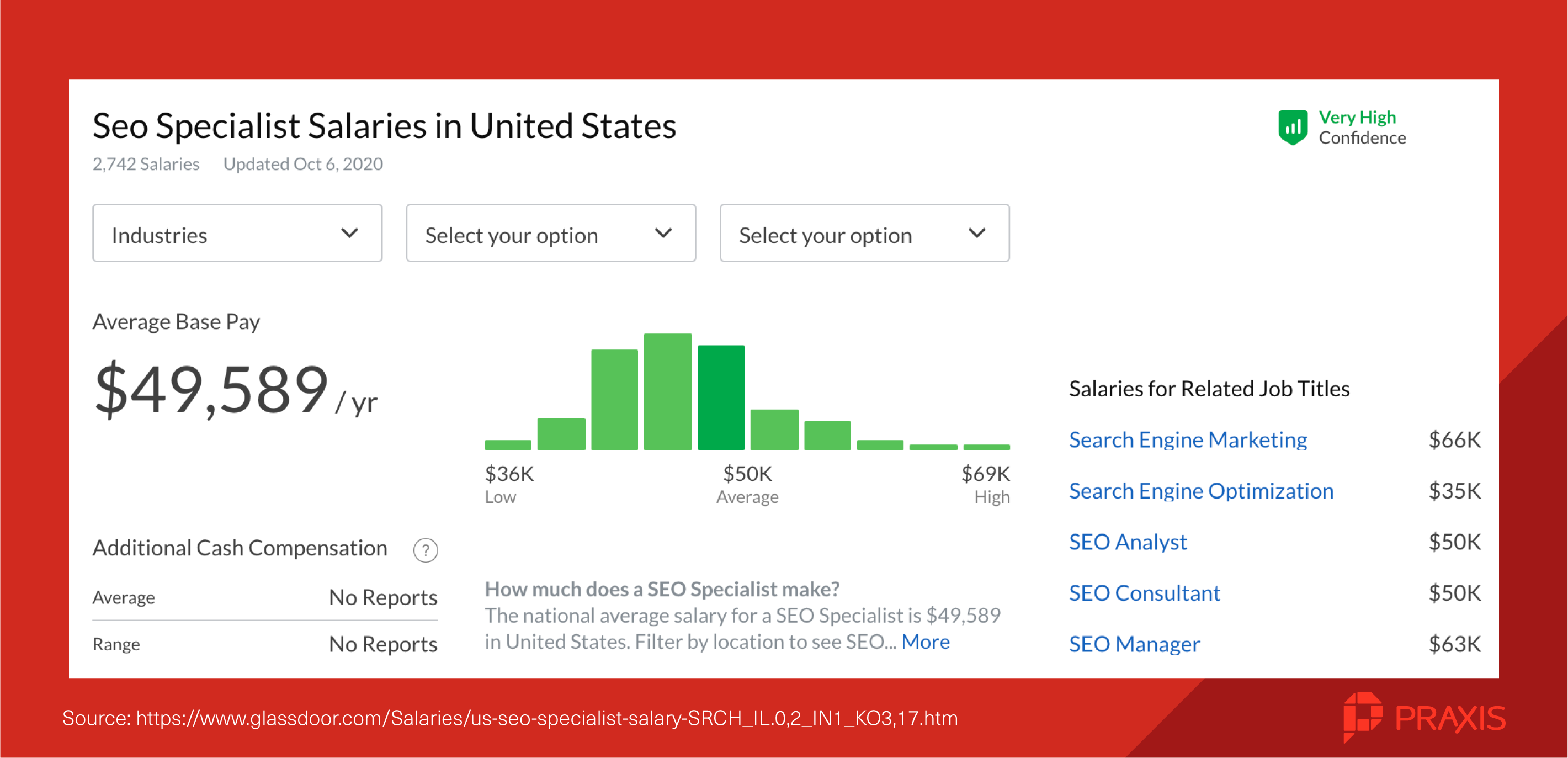
Analytics
If you’re data-savvy, specializing in the analytics side of digital marketing might be a good idea. Good digital marketing (and SEO in particular) relies heavily on analyzing data to track the success of marketing strategies and identify opportunities for improvement.
An analytics specialist should be able to manage data effectively, analyze and interpret data points to glean useful insights, and be able to take initiative and craft strategies based on the insights they’ve extracted from the data. Proficiency in data visualization tools, querying languages (like SQL), and the ability to integrate event-tracking across different platforms are also useful skills to have.
A marketing analytics manager makes around $111.871 per year on average.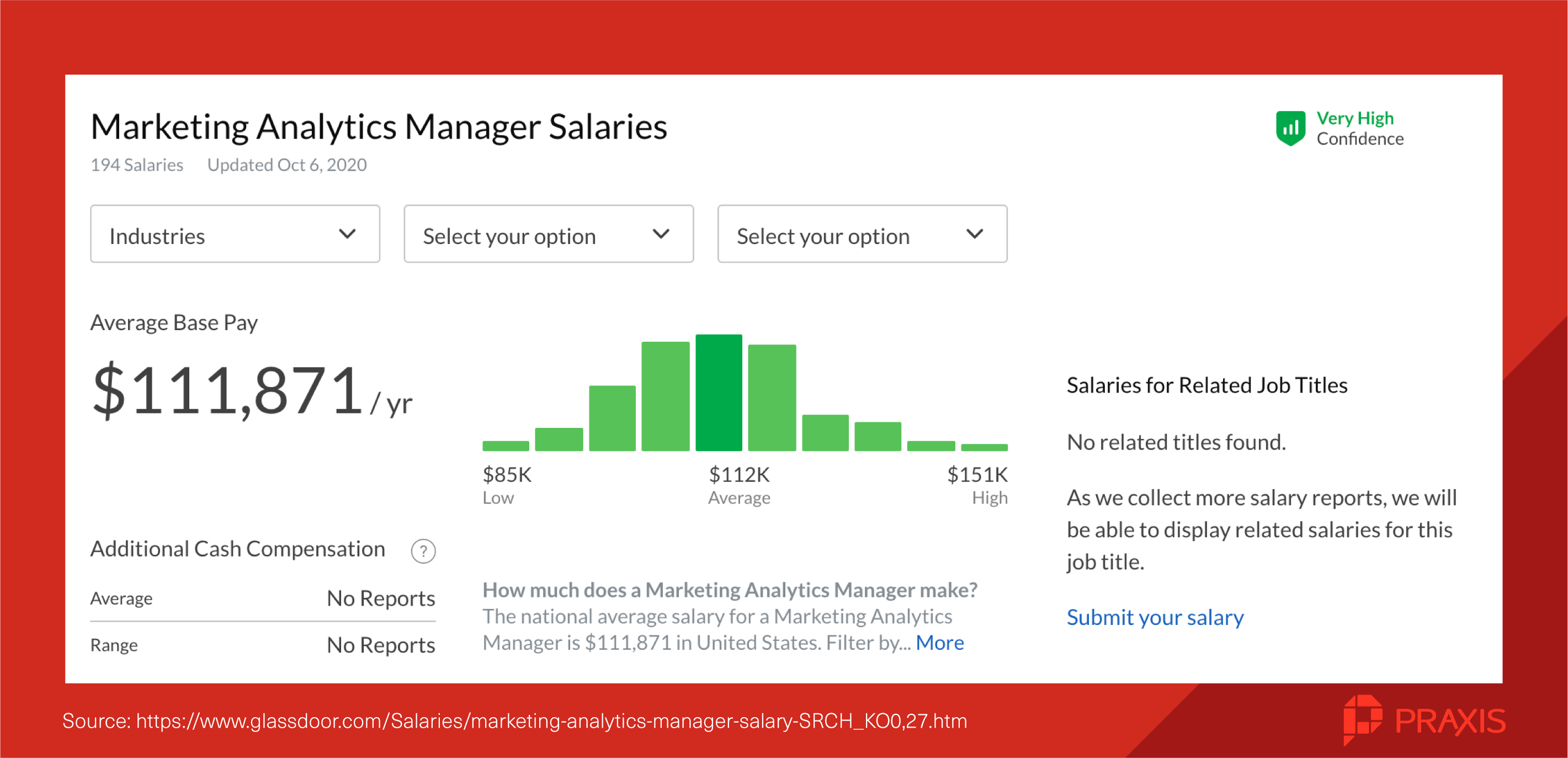
Copywriting
Copywriting is a vital part of any digital marketing toolkit. Not to be mistaken for “content writing,” copywriting refers to the creative process involved in developing a brand identity and voice and writing content that makes people want to buy what you’re selling. Whether it’s a billboard or print ad featuring an image with just one word, a YouTube video teaching people how to use a new product, a website’s copy, a promotional email, or a call to action at the end of a blog, copywriting was involved.
Copywriters need to be able to understand the impact of each individual word on the reader, listener, or viewer. This means choosing your words carefully to communicate precisely what you mean to and entice your audience to buy what you’re selling. Even more importantly, you need to do so in the brand’s voice.
On average, copywriters in the U.S. make $58,465 per year.
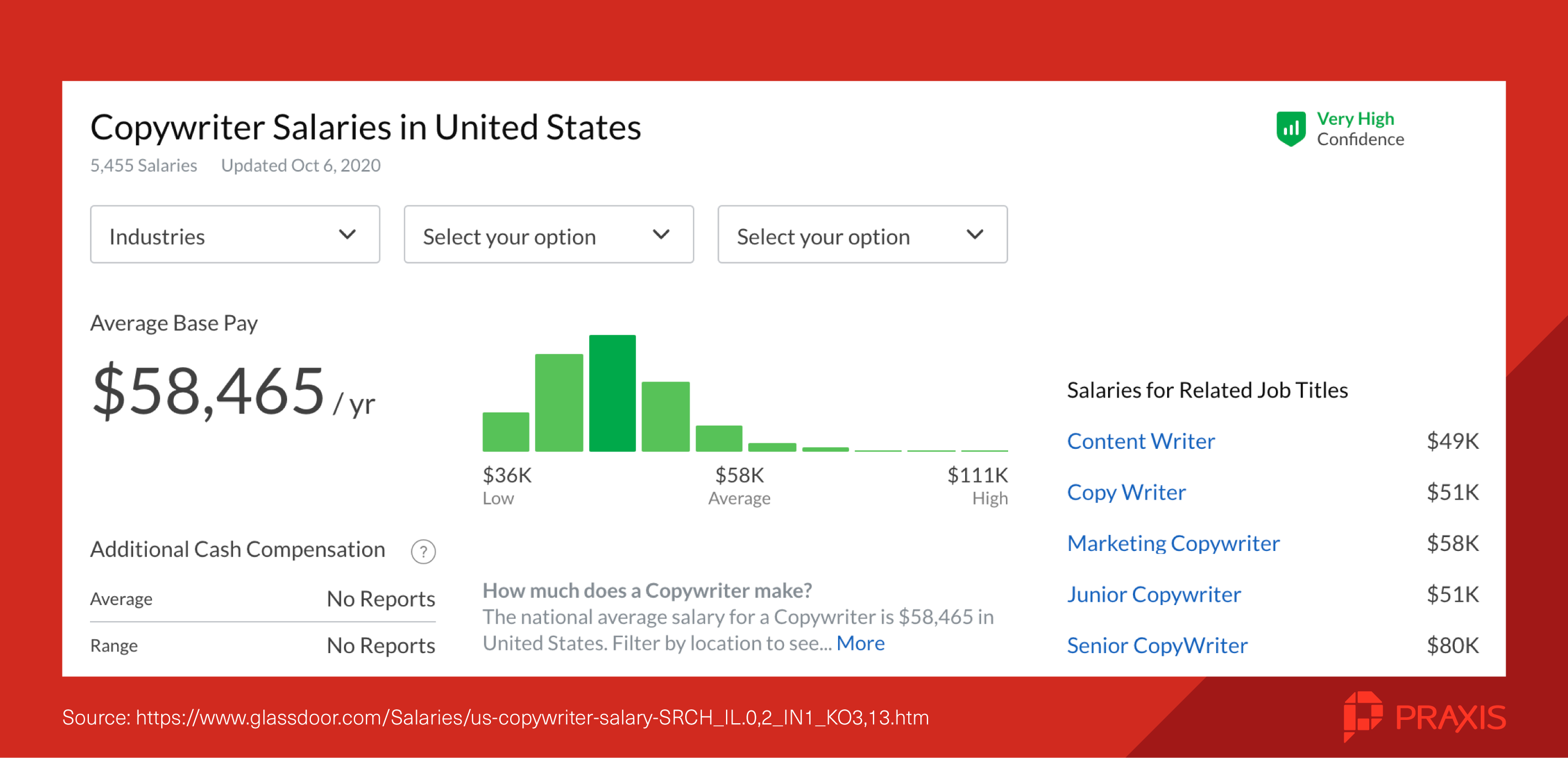
Content Marketing
Content marketing – also known as inbound marketing – is a broad field of digital marketing that seeks to organically attract visitors and convert them into customers through relevant and valuable content.
This content can take many forms: blogs, infographics, videos, podcasts, emails, social media posts, and more. There is a strong overlap between content marketing, SEO, and copywriting, so it’s not uncommon for digital marketers in these specializations to do all of these.
Content marketers make around $56,779 per year in the U.S.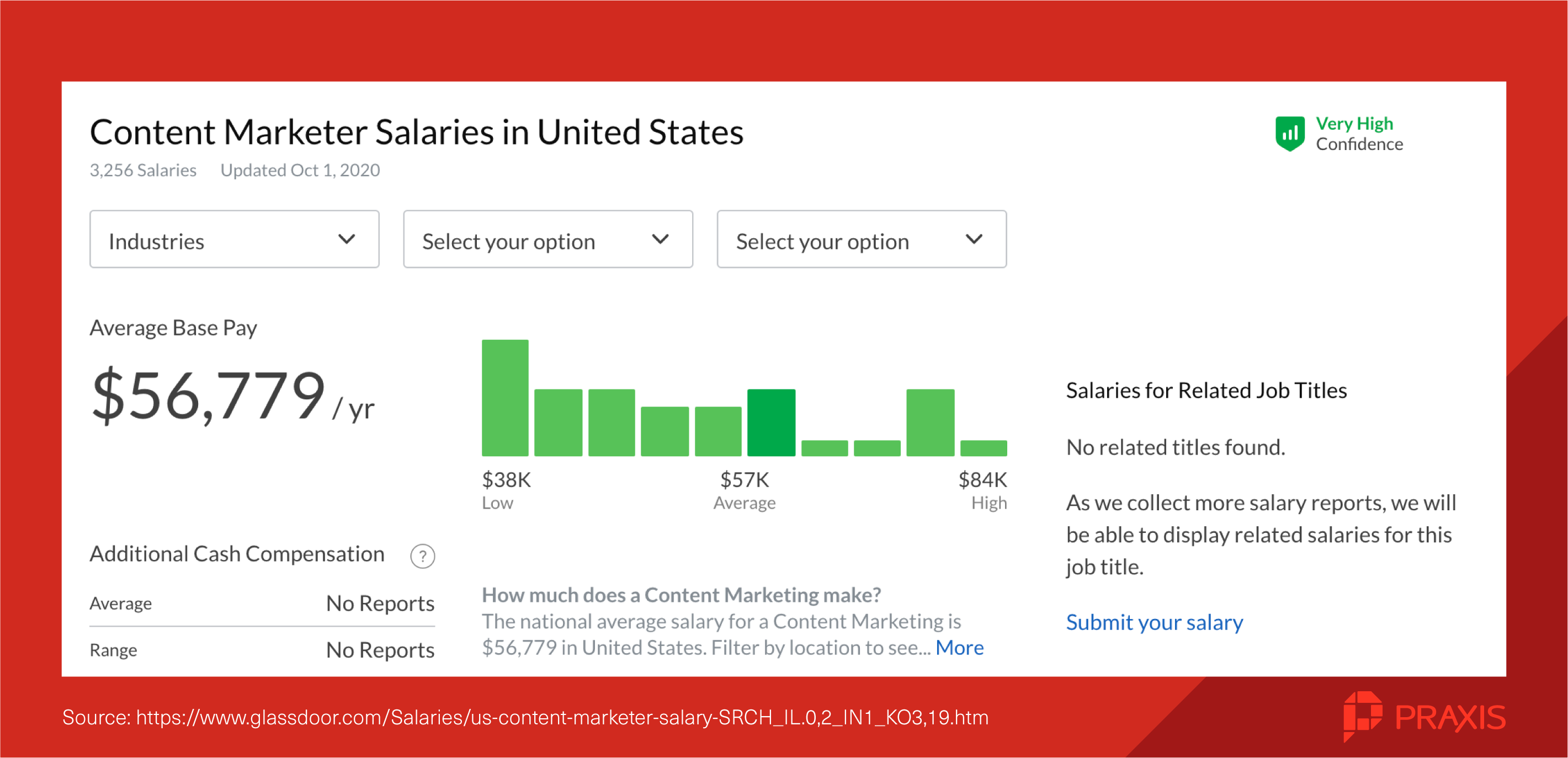
Social Media Marketing
Social media like Facebook, Twitter, LinkedIn, Instagram, TikTok, and a variety of other platforms are massively useful promotion tools and can be used both to drive organic traffic through content marketing or to target specific audiences with paid advertising.
To succeed as a social media marketer, you need to be familiar with the best practices of the platform you’re working with and use these to your advantage. Social media marketers need to be creative and be able to create content that resonates with their target audience, and be skilled at driving engaging in communities. Building relationships with influencers can also be an effective way to boost social media marketing initiatives.
As with most digital marketing streams, analytics skills will come in handy to track engagement and conversions and continuously improve your content.
Social media managers in the U.S. make around $50,473 per year on average.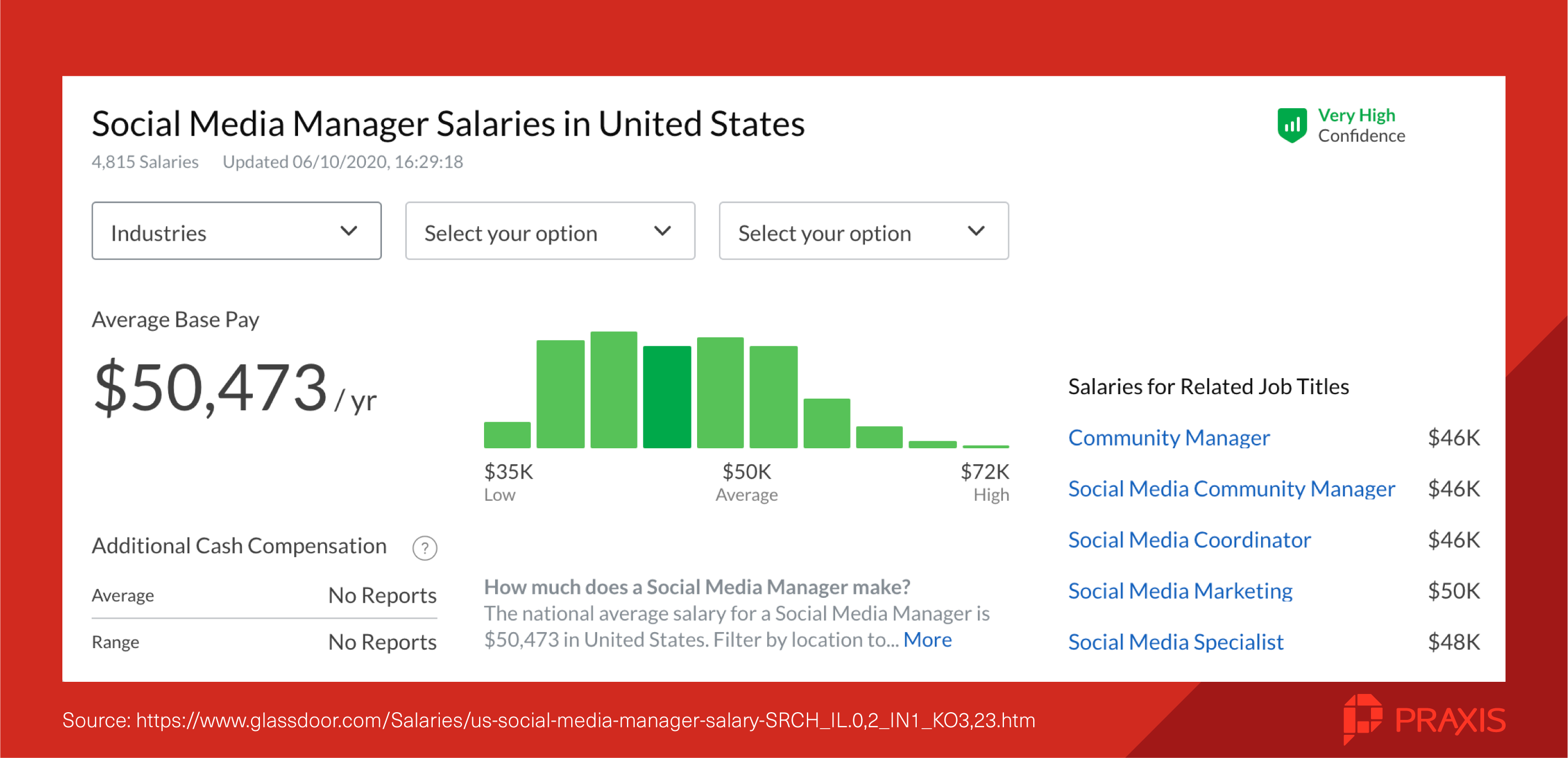
Email Marketing
Email marketing is one of the top lead conversion tools for business, outperforming social media by some 40 percent! These days, most people check their email several times per day, which means that well-crafted, helpful email marketing campaigns can be a highly effective way to nurture leads and drive conversions, whether it’s to sell a software product or convince an e-commerce customer to complete their checkout on an abandoned cart.
Staying abreast of email marketing best practices is crucial to success in this field, particularly in light of email providers frequently updating spam filters. Landing up in the “promotions” tab is fine, but you don’t want your emails to end up in the spam bin or drive recipients to unsubscribe.
Email marketing managers in the U.S. make around $65,834 per year on average.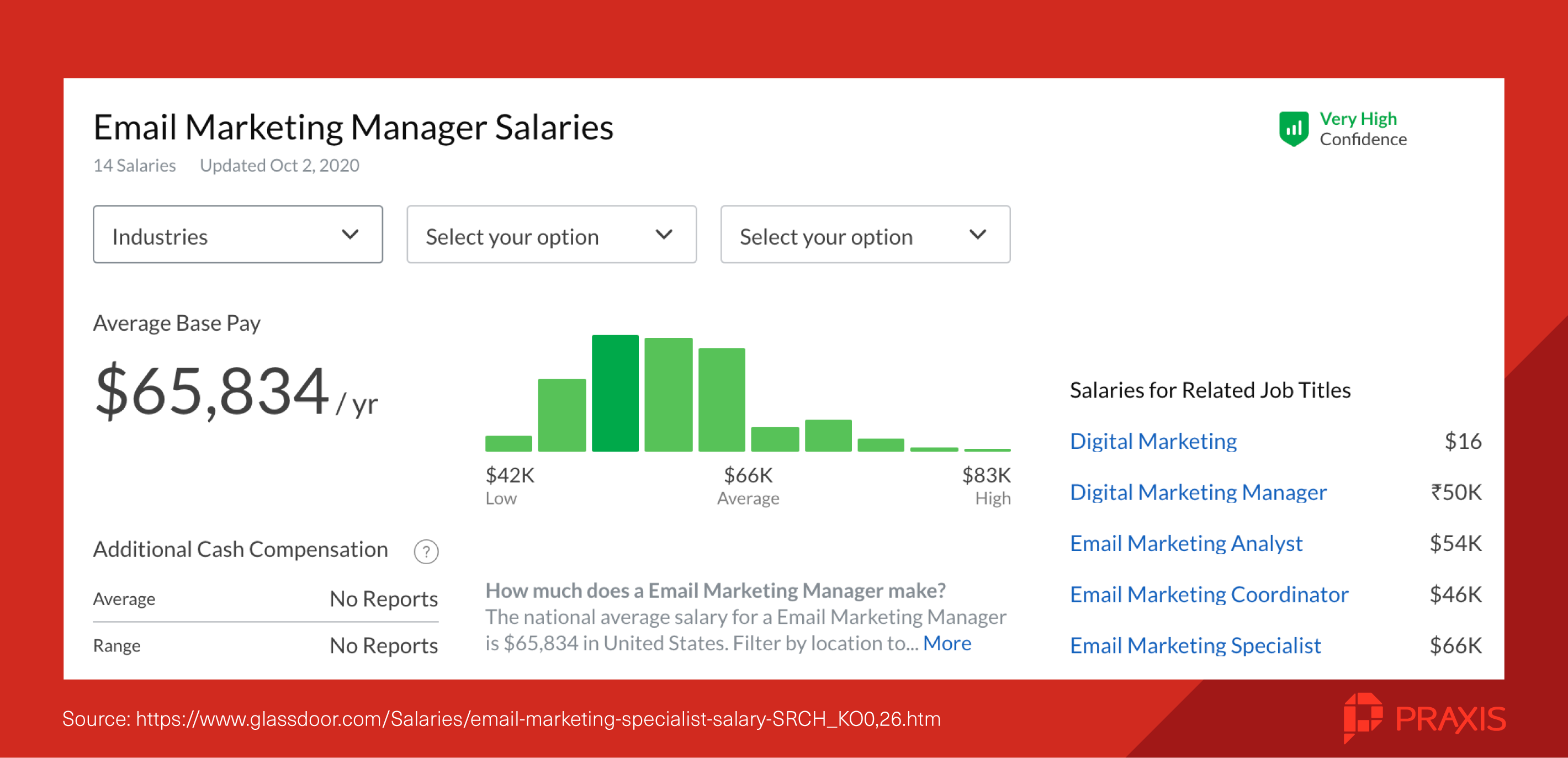
PPC
PPC is short for pay-per-click marketing, search engine marketing (SEM), or simply paid marketing. PPC is what’s behind the ads that appear on the top of your search engine results pages and is one of the most effective ways to reach leads and target buyers according to search intent. PPC is closely related to SEO and also makes use of keyword research, allowing marketers to target specific search terms.
Search engine marketers need a solid understanding of SEO tactics like keyword research, customer segmentation, and data analytics, as well as a good head for budgets.
Paid Search Specialists in the U.S. make an average of per year.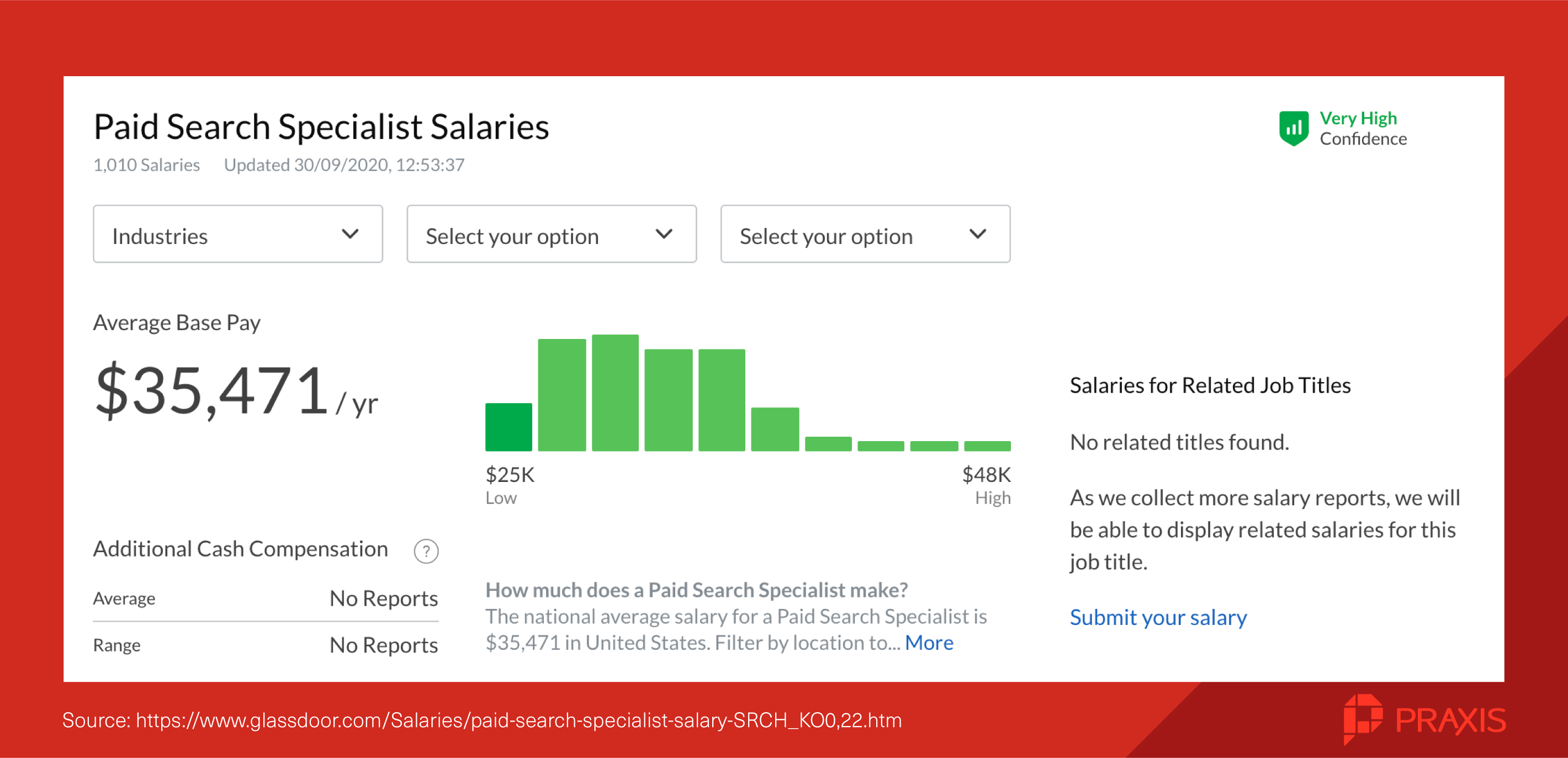
Promotion/Linkbuilding/Digital PR
Public relations, linkbuilding, and promotion are important facets of most successful digital marketing strategies. In a nutshell, this specialization refers to outreach initiatives that drive organic traffic by getting other websites, platforms, and publications to mention your site, and ideally give you a backlink, which helps to give your site domain authority (as long as the site linking to yours has a good domain rating).
To put it simply, the more authoritative websites link to your site using anchor text that is relevant to your content niche, the higher search engines are likely to rank your page in the search results. Guest posting (writing blogs on someone else’s site to mention/link back to yours) is a common “white hat” linkbuilding tactic. PR specialists need to have strong networking and communication skills.
PR Specialists in the U.S. make around $51,899 per year on average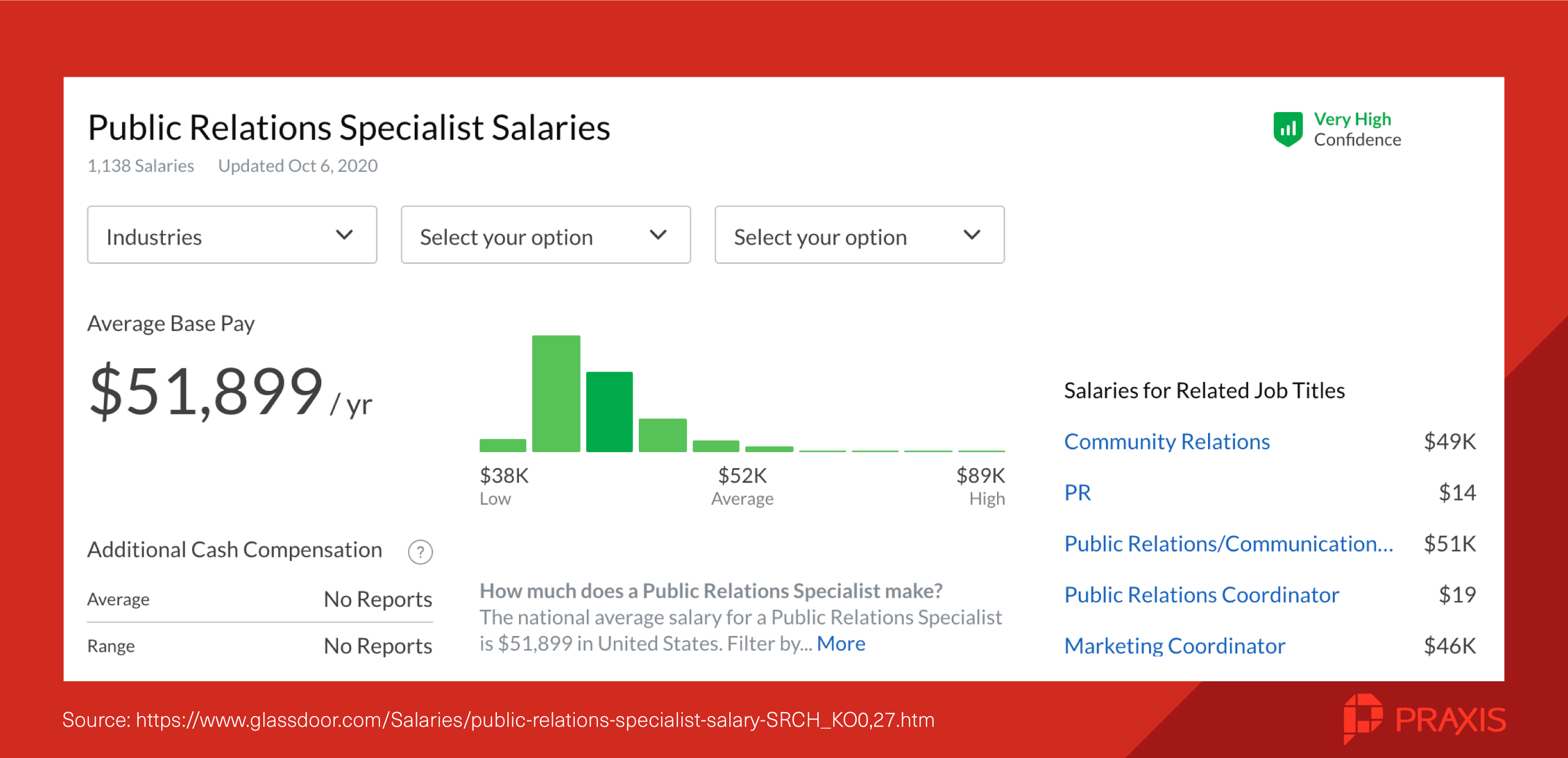
Conversion Rate Optimization (CRO)
Conversion rate optimization marketers specialize in increasing the number of website visitors who convert into leads or customers. CROs use a variety of tools to understand the buyer, their motivations, and their purchase journey in-depth and focus their efforts on tweaking the user experience (UX) to persuade users to make a purchase, sign up, fill out a form, or click on a link.
CROs need a good grasp on human behavior, analytics, UX, and various tools used to segment customers, and skills like copywriting and design thinking are likely to come in handy.
The average CRO salary in the U.S. is $172,569, and 25.9 percent of marketers who earn more than $100,000 per year are CRO specialists, making it the single most lucrative digital marketing focus area.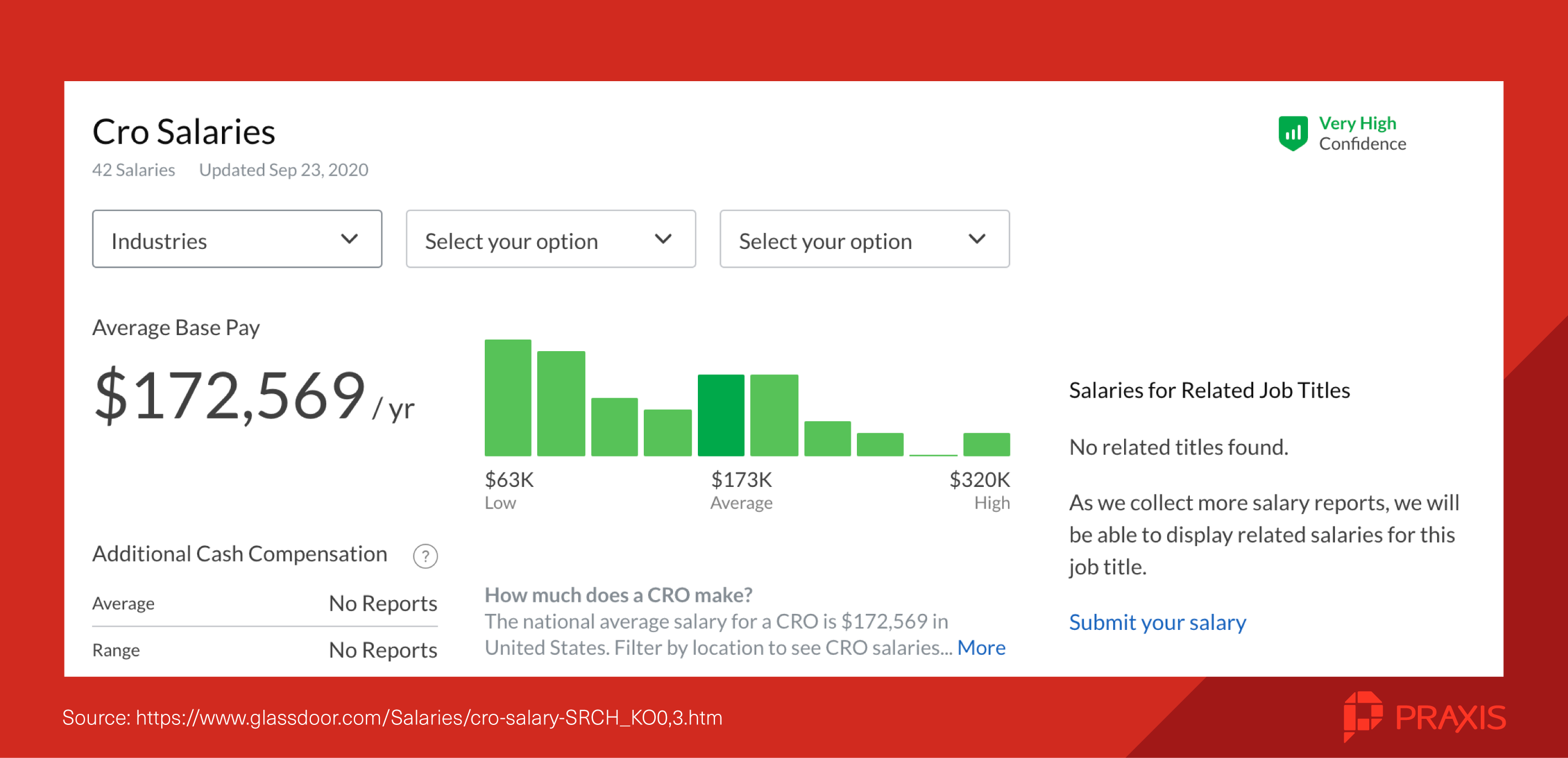
Marketing Automation
Marketing automation refers to the practice of using technology such workflow automation tools and scheduling software to streamline marketing efforts by reducing the time spent performing repetitive tasks. These range from social media posting to email marketing, blog posting, and ad campaigns. Done right, marketing automation creates opportunities for a high degree of personalization, making sure that content is truly relevant to the target audience.
Marketing automation managers need a solid grasp on data analytics and a variety of tools including content management systems and customer relationship management software.
Marketing automation managers in the U.S. make $50,903 per year on average.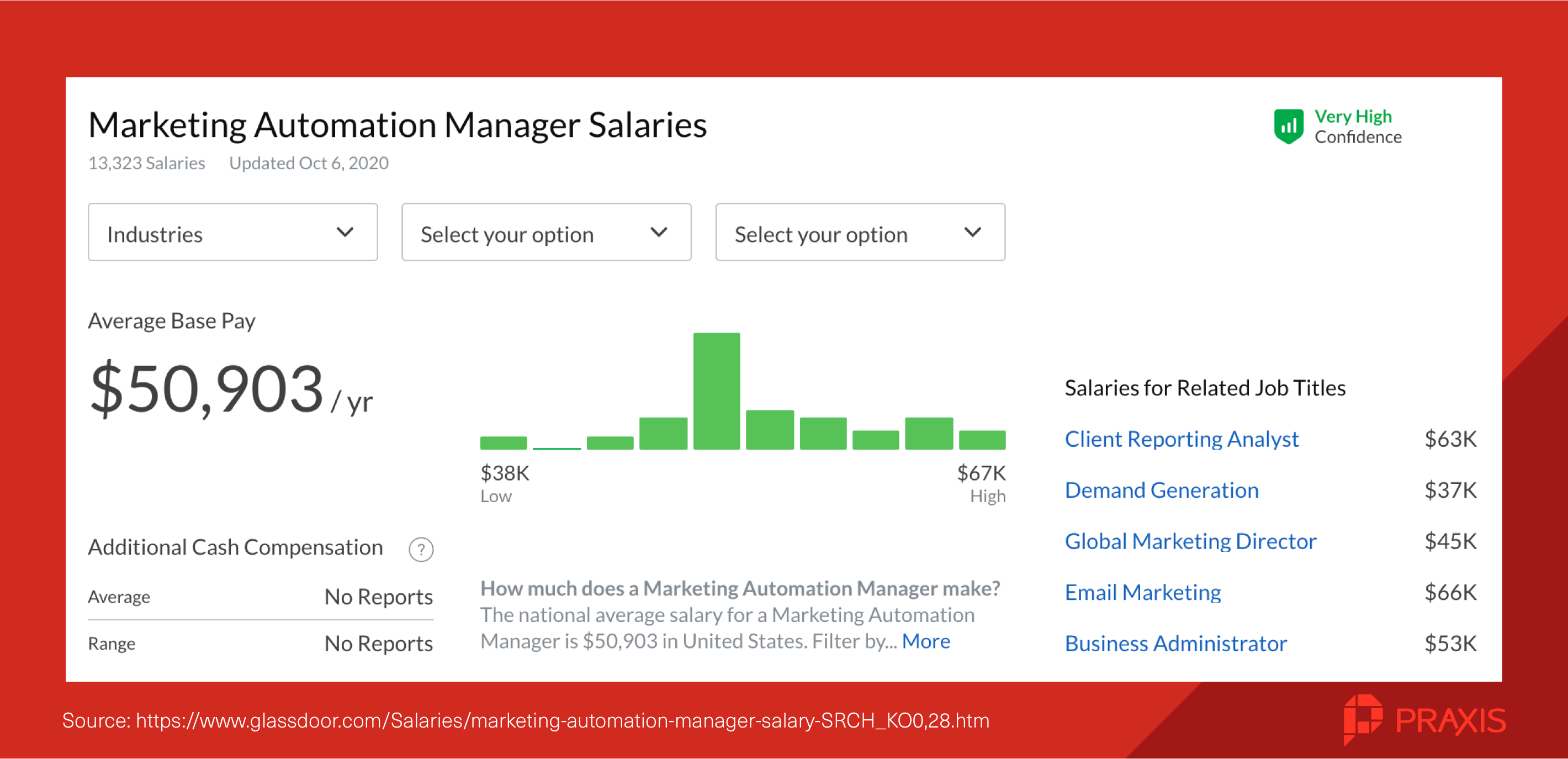
Front-End Web Development
Web developers play a crucial role in digital marketing as they build the foundation that all other digital marketing activities depend on. Front-end developers are responsible for building the user interface that users see and interact with when they visit a website.
Given how important a seamless user experience is today, web developers play a bigger role in driving conversions than many people realize, and their role doesn’t end when the site goes live. Developers are often involved in creating landing pages and implementing integrations between various marketing tools, especially in the case of custom-coded sites.
Front-end developers typically work using some combination of HTML, CSS, PHP, and Javascript.
The average front-end developer salary in the U.S. is $76,929 per year. 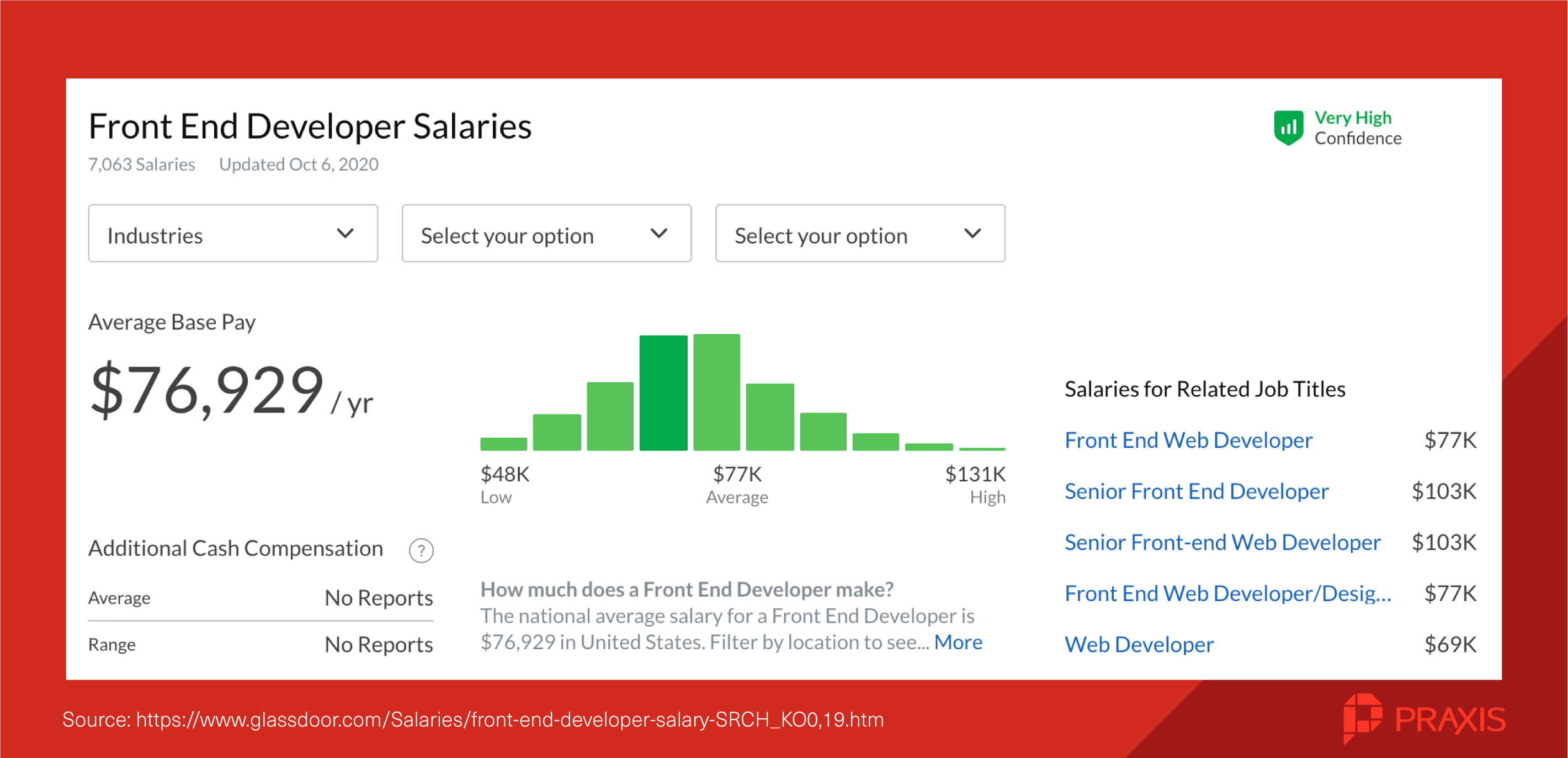
Graphic Design
Graphic designers play a vital role in any successful digital marketing strategy by synthesizing visual elements like illustrations, graphics, typography, and layout design to make the content appealing, engaging, and easy to understand.
Graphic designers need to be creative, visual thinkers with a mind for branding and have a solid grasp of software used to create visual content, such as the Adobe Creative Suite. Communication skills are also important as non-visual people often struggle to communicate exactly what they have in mind, which means that designers often need to nudge them to get the direction they need.
Graphic designers in the U.S. make around $58,614 per year on average.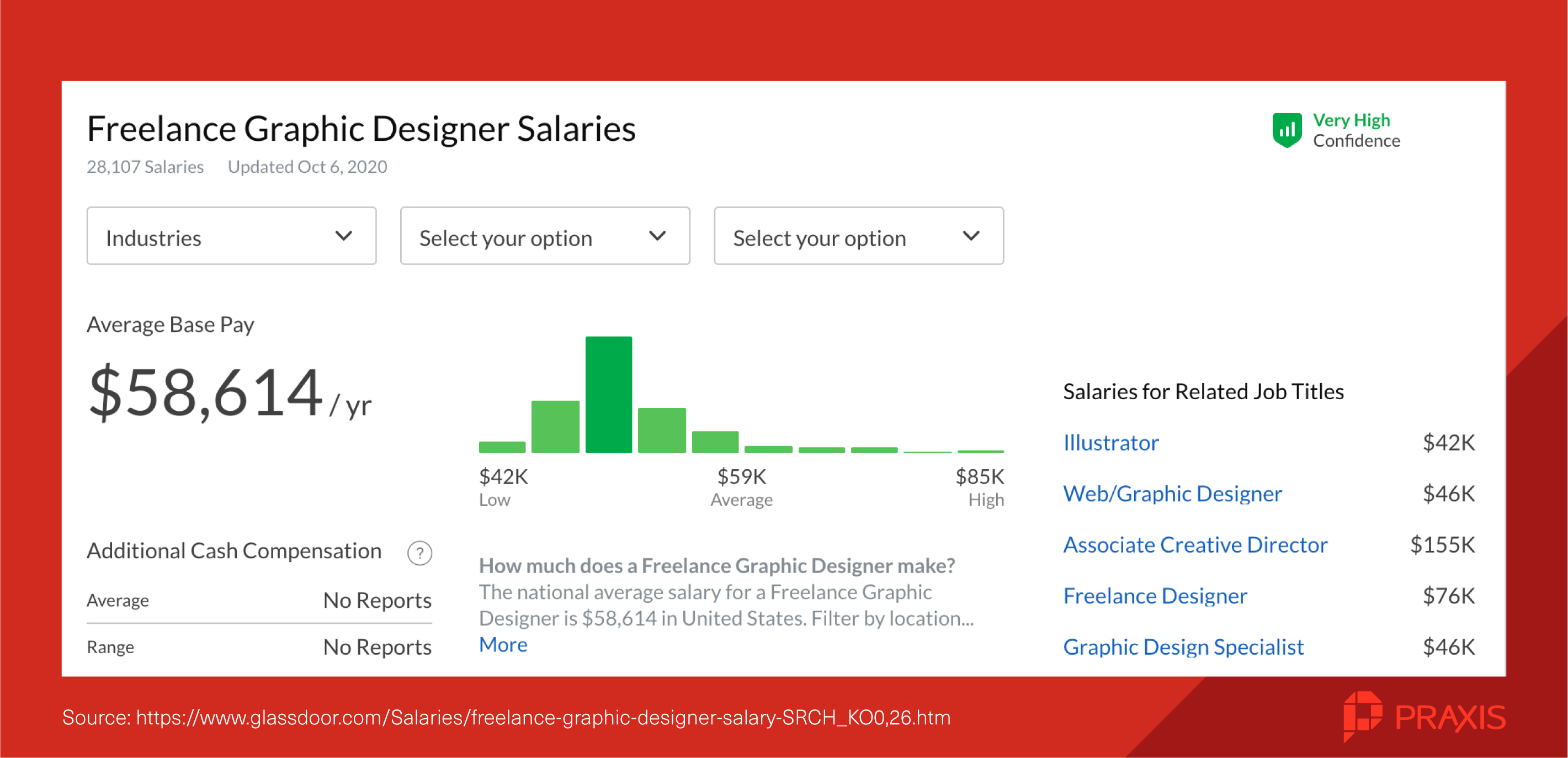
Project or Content Management
Content managers or marketing project managers can be absolutely indispensable to maintaining order (and content quality) once your marketing operations grown beyond a certain point. While content/project managers are not always marketing strategists, it’s not uncommon for these roles to overlap somewhat.
Content/project managers help to make sure that individual marketing projects fall in line with the bigger picture and keep things running smoothly, creating content calendars, and managing internal workflows. They are also often responsible for publishing content, maintaining CMSes, and tracking marketing performance using analytics.
Content/Project managers need to be highly organized and skilled at leading teams.
On average, content managers/marketing project managers/digital marketing managers in the U.S. make between $56,779 and $75,251 per year.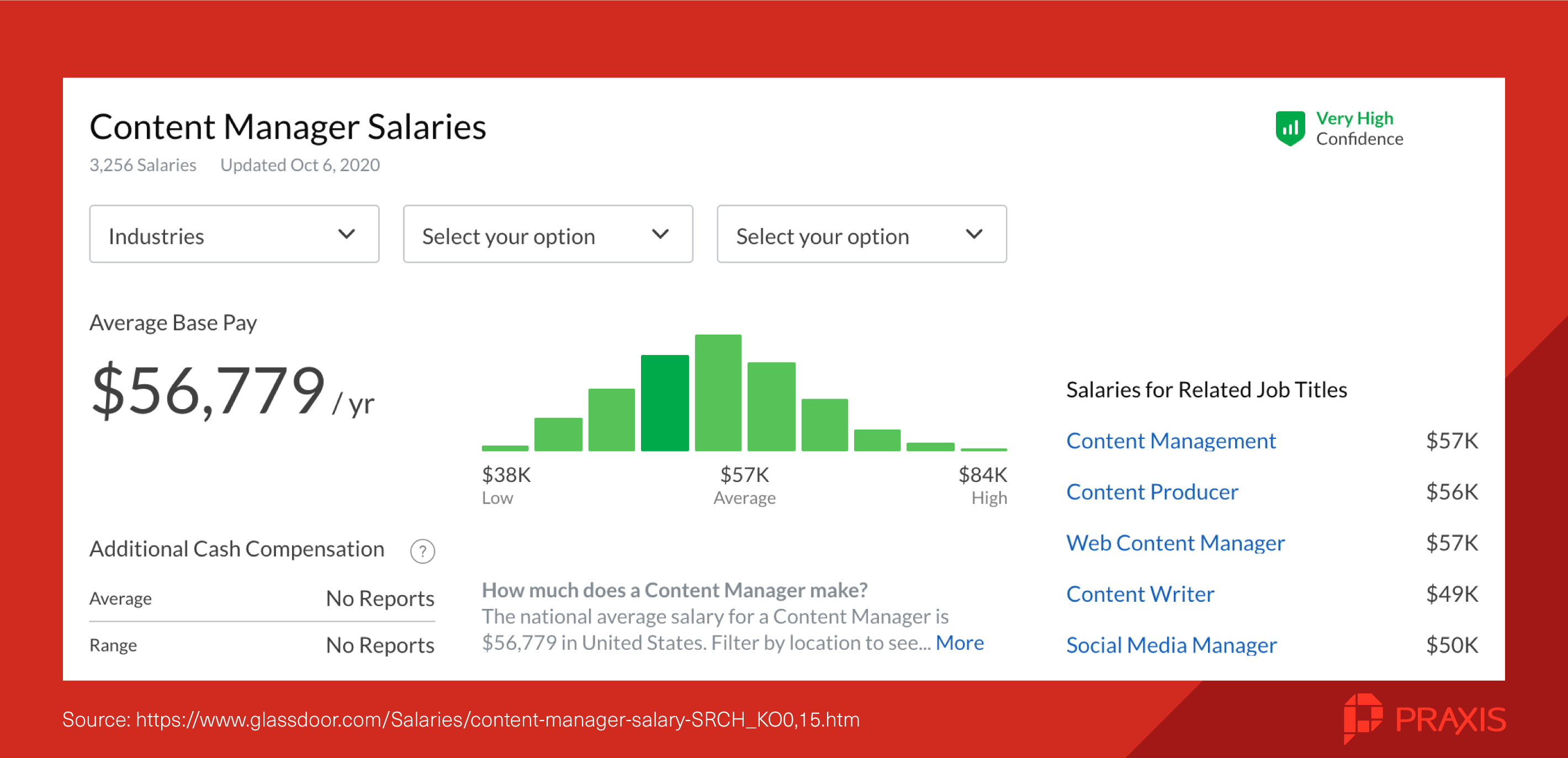
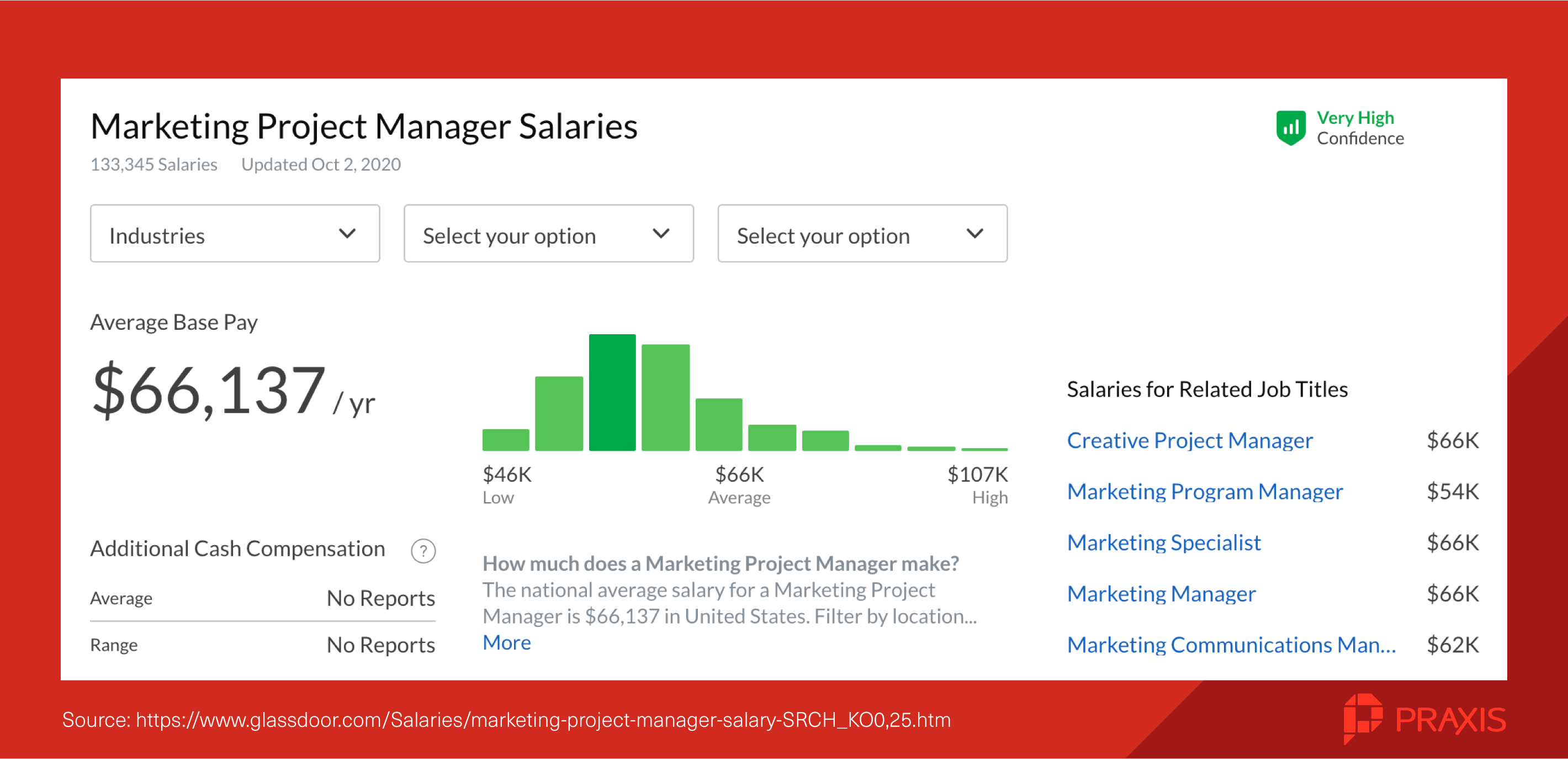
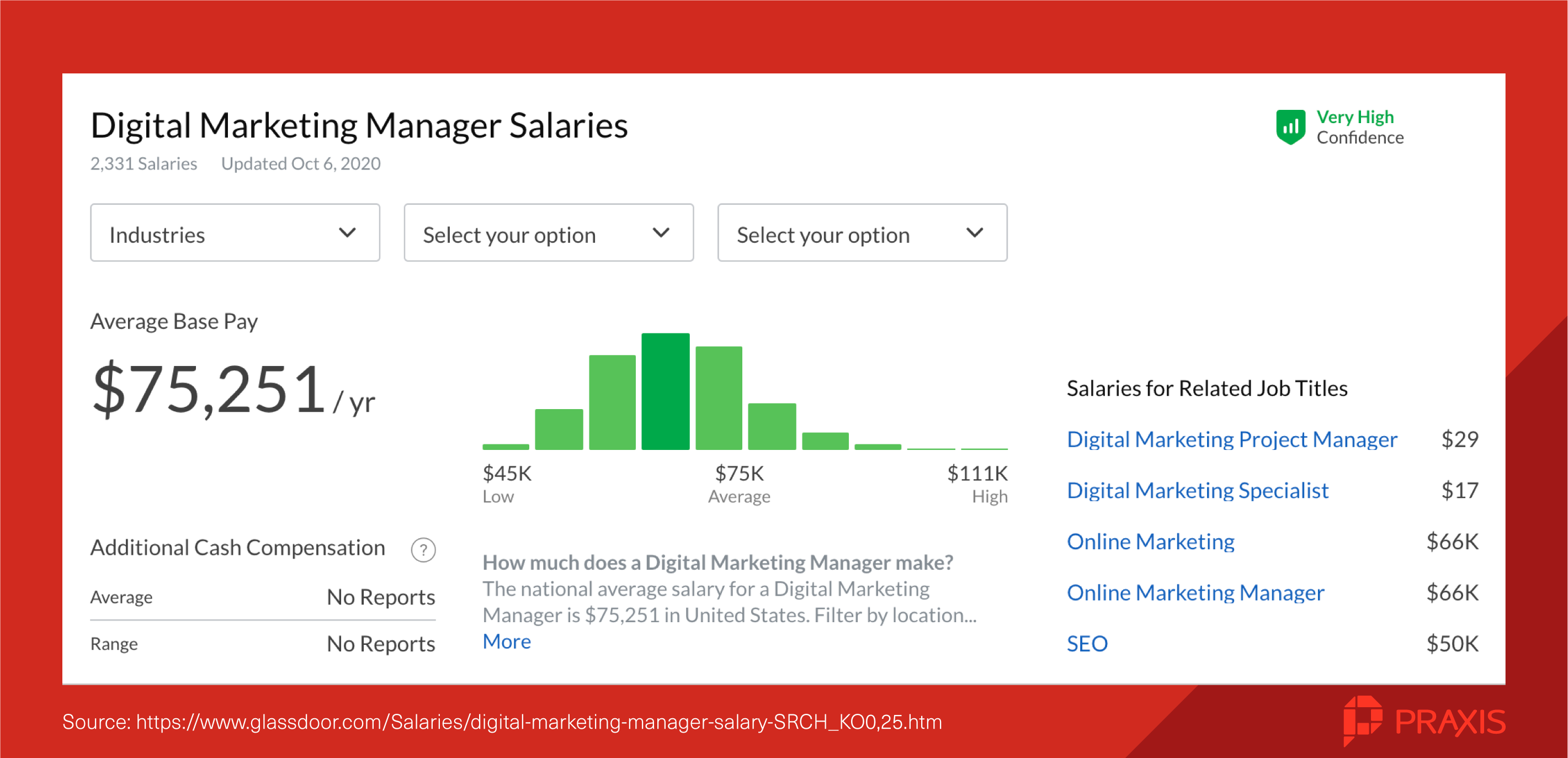
How to Get Started in Digital Marketing
Getting started in digital marketing is relatively easy. You don’t need a degree or any other qualification to become a successful digital marketer. You can start by reading blogs, watching YouTube videos, listening to podcasts, and looking at what successful digital marketers are doing and saying.
A good place to start is by researching each specialization in-depth and deciding which two or three areas sound most interesting to you. Once you know what you want to focus on learning, you can create your own curriculum to power your self-directed education.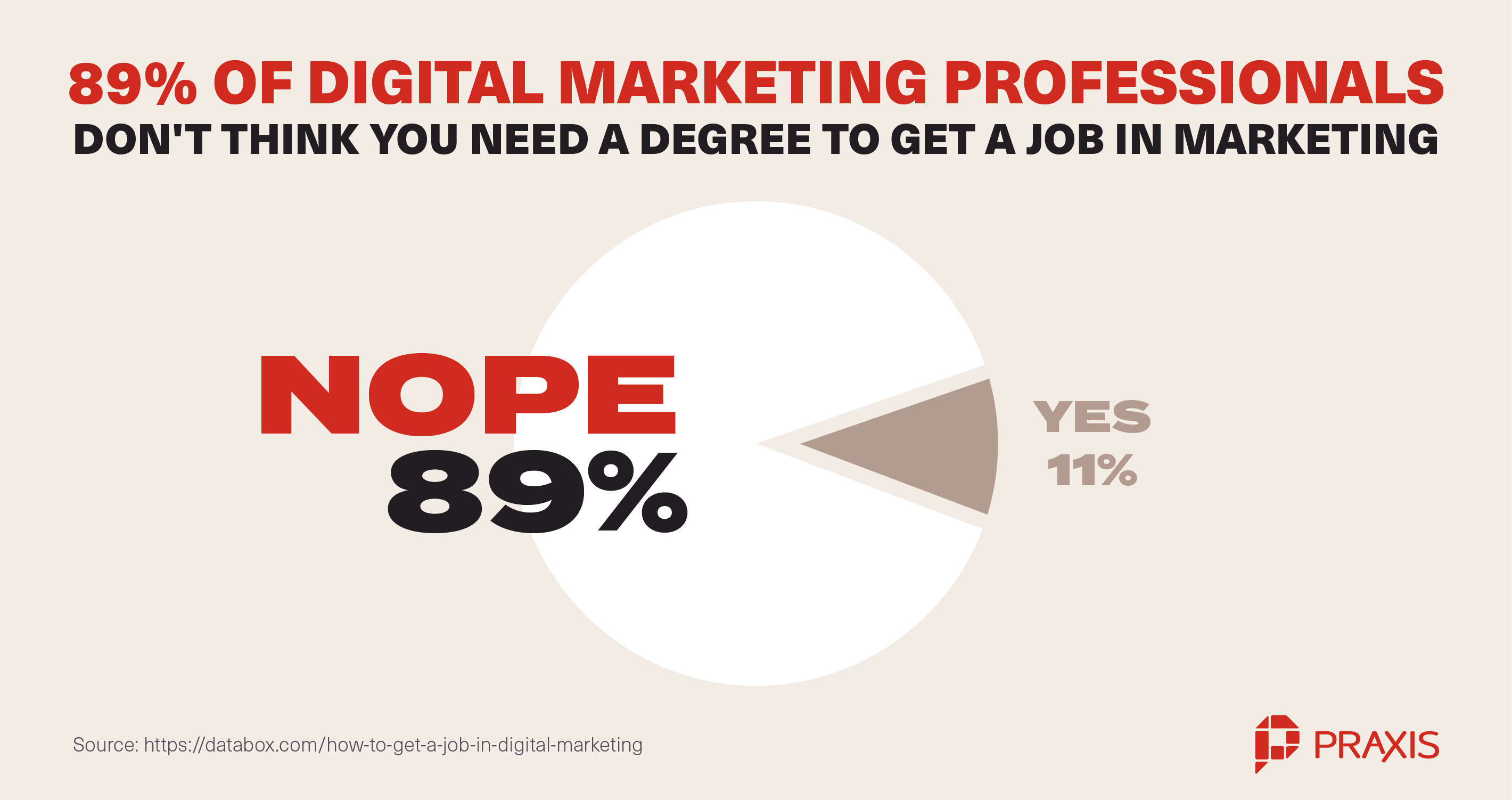
The most successful digital marketers tend to be “T-shaped marketers” that have a general understanding of multiple aspects of marketing but expertise in one or more specializations.
This baseline knowledge of a broad swathe of marketing skills and best practices is useful because there’s a lot of overlap between different channels and digital marketers often need to collaborate with other marketers with different specializations. Knowing the basics of different aspects of marketing makes it easier to consider and plan for the needs of other workflows within any brand’s content strategy.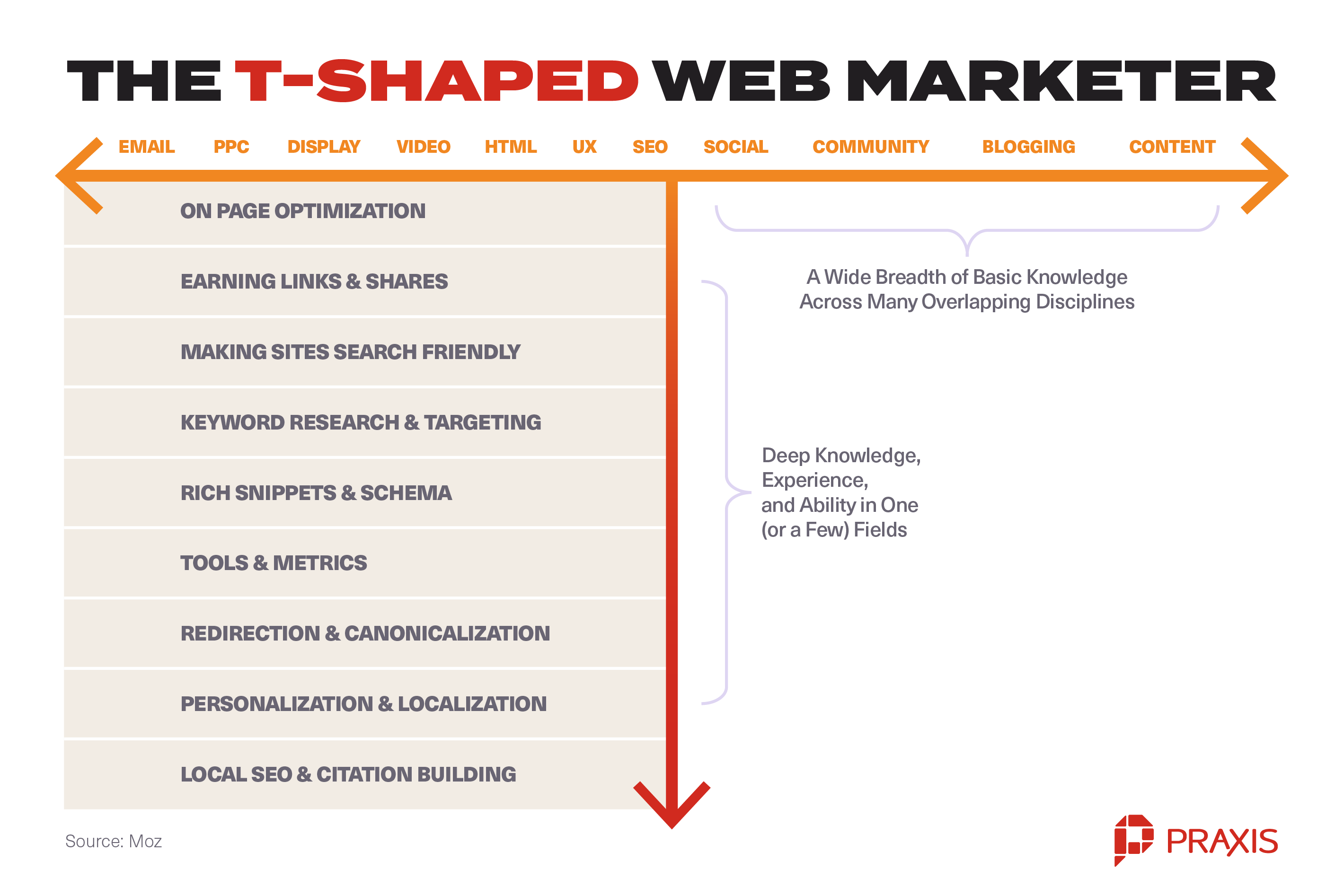
SEOs need a wide range of basic knowledge and deep knowledge of a few closely related fields
There’s no universal roadmap to becoming a digital marketer, and every individual’s marketing career path will look different. However, most prospective employers – and customers, if you choose the freelance route – will want evidence that you’re as good as you say you are.
The single most important thing you can do is to build up a portfolio and create tangible evidence of your capabilities. And if you can back it up with data (such as Google Analytics and Google Search Console data) that shows the efficacy of your work, that’s even better.
The simplest way to start is by creating a website to market your services (or a product) and consistently putting your learnings into practice to improve your own traffic. This has the added bonus of being the most effective way to learn. The more you experiment and practice, the sooner you’ll discover what works and what doesn’t.
Read about email marketing and A/B testing? Create an email sequence and add a subscription signup form to your site. Run an experiment and create multiple versions of the same email and see which ones have the highest open rate.
Want to learn how to run targeted paid ads through Google Ads or Facebook Ads? Set up an ad for your services and experiment with what works. Just be sure to do your research in advance so you know what you’re doing and don’t end up spending more than you budgeted for.
How to Get a Job in Digital Marketing Without a Degree
Getting a job in digital marketing essentially comes down to three things:
- How well you do your job,
- How effectively you can convince prospective clients/employers that you do your job well, and
- Your network
With that in mind, here are a few tips to help you build your digital marketing career:
- Start by marketing yourself/your own services
- Zone in on a specific skill set to hone your expertise
- Build up a digital footprint and portfolio of work to demonstrate your abilities and develop your brand
- Learn out loud to show your knowledge and accelerate your learning through conversations with others in your industry
- Start offering your services to people you know to help build your portfolio
- Create a pitch deck and tailor it to individual clients
- Start freelancing and pitching clients
- Continuously hone your pitch deck
- Create case studies using data from past successes
- Continue to tweak your methods as you gain experience, using insights gleaned from marketing analytics
- Apply for digital marketing internships, apprenticeships, or entry-level marketing positions
- Surround yourself with industry experts by participating in marketing-related events and conversations to build your knowledge and your network
- Join a bootcamp like Praxis that teaches digital marketing skills and connects you with professional opportunities in the field of marketing (apply below)
- Read our tips on getting your foot in the door when you lack experience
- If you’re on the fence about going to college to get a marketing degree, ask yourself these questionsbefore you decide.

Wait!
Before you go, we’ve put together some resources below that you may find useful as you get started in digital marketing.
Specialized Digital Marketing Courses
Having a couple of certifications under your belt also certainly won’t hurt when it comes to validating your skills. Below, we’ve compiled a list of digital marketing courses to help you get started. Please note that this is not an exhaustive list.
General Content Marketing and SEO Courses in 2020:
- Blogging For Business by Ahrefs
- Content Creation Courses by Hubspot Academy
- Content Marketing Courses on LinkedIn Learning
- The Strategy Of Content Marketing on Coursera
- Content Marketing Masterclass on Udemy
- Fundamentals of Digital Marketing by Google
- Beginner’s Guide to SEO by Moz
- Canva Design School by Canva
- Basics of Photoshop: Fundamentals for Beginners on Skillshare
Social Media Marketing Courses in 2020:
- Introduction to social media strategyby Buffer
- Facebook Blueprintby Facebook
- Hootsuite Academyby Hootsuite
- Social Media Academyby Hubspot
- Lab Plus certification by DigitalMarketer
- Social Media Marketing Mastery: Paid Performanceon Udemy
- Social Media Marketing: Organicon Udemy
Marketing Analytics Courses in 2020:
- Analytics Academyby Google
- Marketing Analytics by the University of Virginiaon Coursera
- MicroMaster Program in Marketing Analyticson EdX
- The Complete SQL Bootcampon Udemy
Just don’t let a course take the place of real experience and experimentation. As Adam Connell of Blogging Wizard has said, “Qualifications are great but they’re just words saying you can do something. You need to prove what you’re capable of.”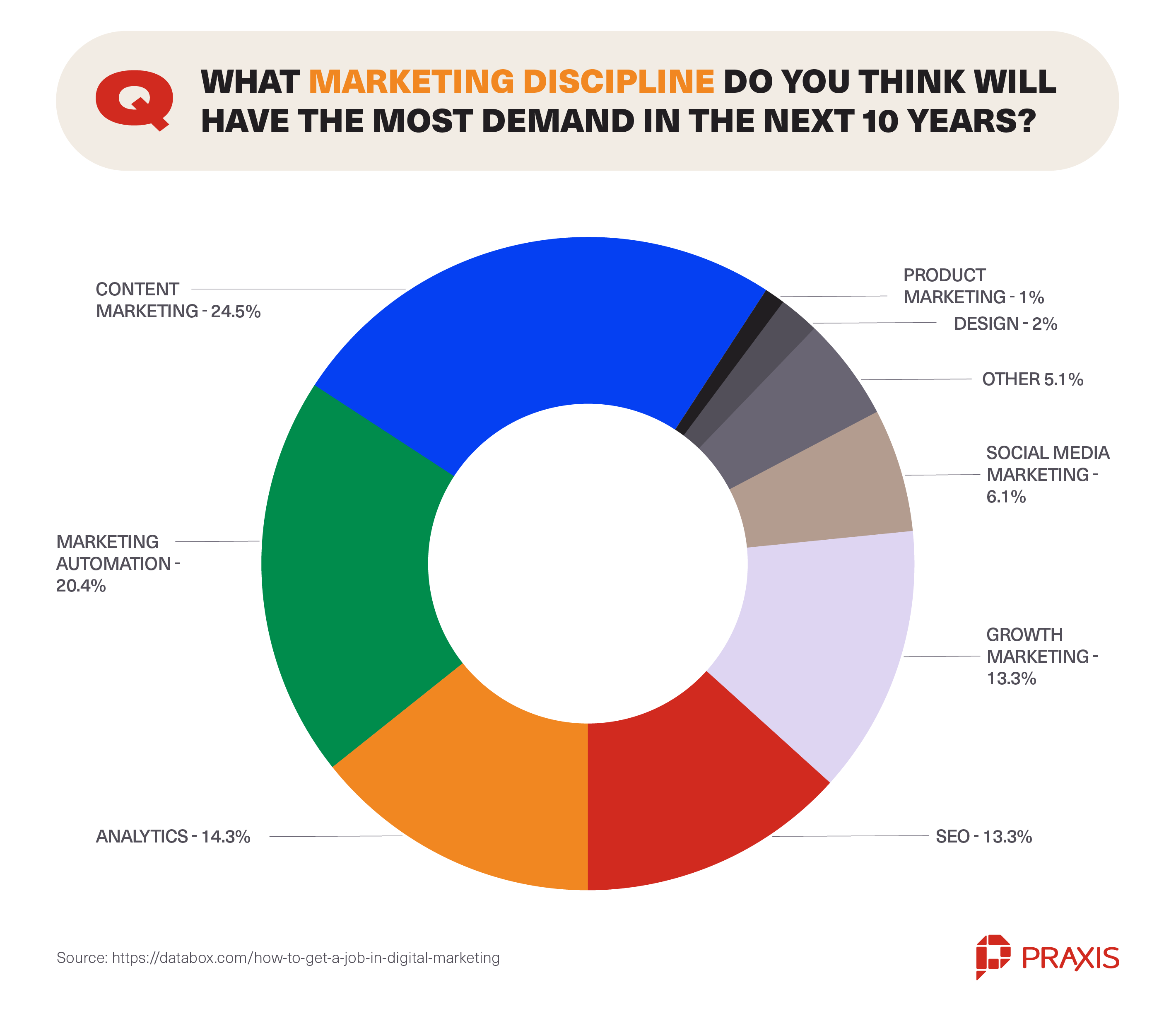
According to a recent Databox survey, Content Marketing, Marketing Automation, Analytics, SEO, and Growth Marketing are expected to see the biggest growth in demand in the next 10 years.
30 Digital Marketing Experts and Resources to Follow to Continue Learning
To make sure you keep learning and don’t miss out on any important digital marketing news, we’ve put together a list of 30 industry influencers and useful digital marketing resources to follow.
- Avinash Kaushik, Author of Web Analytics 2.0 and Web Analytics: An Hour a Day
- Towards Data Science, A Medium publication dedicated to – you guessed it – data science
- The Segment Blog, by customer segmentation SaaS provider Segment
- The Clearbit Blog, by marketing data intelligence company Clearbit
- Val Geisler, CEO at Fix My Churn and email marketing guru
- Moz, an industry-leading SEO tool
- Matthew Barby, Director of Acquisition at HubSpot, an industry-leading marketing management suite
- Search Engine Land, a resource for SEO and SEM news
- Kieran Flanagan, VP of Growth at HubSpot, an industry-leading marketing management suite
- The CoSchedule Blog, by Coschedule, an industry-leading marketing workflow automation tool
- Search Engine Journal, a resource for SEO industry professionals
- John Doherty, Founder of Credo, a marketplace for hiring pre-vetted digital marketers
- Eric Siu, CEO of Single Grain, Founder of Growth Everywhere
- Wordstream, an industry-leading digital marketing tool
- Brian Dean, Founder of Backlinko, an industry-leading SEO training resource
- The Backlinko SEO Blog, by Brian Dean of Backlinko, an industry-leading SEO training resource
- The Content Marketing Institute, a leading industry education resource
- Rand Fishkin, CEO & Co-Founder of Moz, a leading SEO tool
- Seth Godin, author of Purple Cow: Transform Your Business by Being Remarkableand This Is Marketing
- Tim Soulo, Chief Marketing Officer and Product adviser at Ahrefs, an industry-leading SEO tool
- Ahrefs, an industry-leading SEO tool
- Buffer, an industry-leading social media management/scheduling tool
- SEMrush, an industry-leading digital marketing tool
- Hootsuite, an industry-leading social media management tool
- Ann Handley, Author of Everybody Writes: Your Go-To Guide to Creating Ridiculously Good Content
- Matt Navarra, Social media industry commentator & consultant
- Gary Vee, Serial entrepreneur (Wine Library, VaynerX, VaynerMedia) and social media guru
- Charlie Lawrence, Founder & CEO of Gecko Squared and Facebook Ads Strategist
- Social Media Today, a social media marketing news resource
- Social Media Examiner, a social media education and news resource
November 12, 2020
